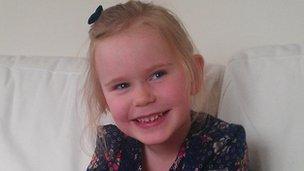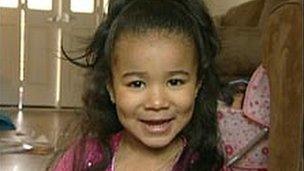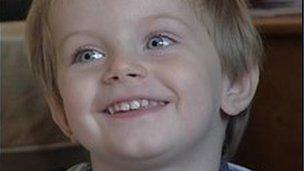Tell-tale signs of a genius child
- Published

Heidi Hankins, four, has been accepted into Mensa with an IQ of 159
Another young child with an exceptionally high IQ has been accepted by Mensa.
Four-year-old Heidi Hankins from Winchester is said to have an IQ of 159 - just one point below that of Einstein and Stephen Hawking.
But what are the tell-tale signs for a parent that their child is gifted?
Are the rows of sponge numbers they are setting out in actual fact a mathematical formula?
Are they showing signs of musical talent while bashing on their glockenspiel?
For some parents, experiencing unusual intelligence in their infant is a reality.
In the case of Heidi, her parents noticed she was a bright child extremely early.
Her father, Matthew Hankins, said: "She started to try and talk from the minute she was born but obviously she couldn't verbalise anything.
"She would look you in the eye and attempt to speak.
"When she could talk, before she was a year old, she was speaking in whole sentences."
She was also quick to pick up reading skills.
"We put her on the laptop to watch CBeebies because we didn't have TV at the time," Mr Hankins said. "When we came back to her we found she was navigating around the website.
"First of all she was just clicking on the pictures that she liked but very quickly we realised she had taught herself to read the text and follow instructions.
"By the time she was two she could read primary school books."
She also taught herself to add and subtract.
Charles Dickens
With clever children it appears you cannot stop them from fast-tracking their learning.
British Mensa's gifted child consultant Lyn Kendall said she discovered her son Chris, who is now 30, as an infant teaching himself how to write before the rest of the household awoke.
Aged four, he would prefer to read Charles Dickens at school instead of playing He-Man with the other children in the playground.
Gifted children "often prefer the company of older children or adults," she said.
When Chris was invited to his classmates' parties "you could guarantee he'd be in the kitchen with a cup of tea chatting with the adults - and not racing round with the other kids".
So what other tell-tale signs are there that your child could be a genius?
Mensa has a checklist on its website that includes:
• An unusual memory
• Reading early
• Unusual hobbies or interests or an in-depth knowledge of certain subjects

Elise Tan Roberts from London was two when she joined Mensa in 2009 with a 156 IQ
• An awareness of world events
• Asks questions all the time
• Developed sense of humour
• Musical
• Likes to be in control
• Makes up additional rules for games
Educational psychologist
Mensa itself does not assess children below the age of 10, but if parents feel the need to have their child's IQ tested then they have to go through an educational psychologist.
As many of these do not assess children under six, having your infant tested can be costly - between £250 and £750, according to Julie Taplin, the deputy chief executive of the National Association of Gifted Children (NAGC).
Mr Hankins said the family wanted to get Heidi tested out of curiosity. He said: "Her brother was a bright child but this was kind of a league above, you know, supernaturally bright so we were just interested to see."
Ms Taplin said an assessment was not always necessary.
"Some parents often think if they have a piece of paper that their child has a specific IQ that their school will therefore feel they must meet their child's needs and have the resources to do so," she said.
"But schools are not obliged to look at the educational psychologist's report."
If parents do feel an IQ test is necessary, then the Weschler test is the one usually carried out on young children and is the test Heidi completed.

Oscar Wrigley from Reading was two when he scored an IQ of 160 in 2009
"It is a battery of tests," said Mrs Kendall, "looking at non-verbal functioning - your ability to solve a problem with things like shapes, looking at a verbal IQ - the use and understanding of language, numerical skills, problem solving and practical tests such as block formation."
Mrs Taplin said it was important to offer a support network for the child that focuses as much on their social and emotional skills as their schooling.
"Academic potential has to be balanced by the child's overall well-being," she said.
Parents also need to be aware of the some of the negative aspects of being a gifted child, including becoming aware of the world too quickly and not being able to interact with children of their own age.
Mrs Kendall said: "I will never forget when I first joined NAGC, one of the first young people I met said, 'I just want to be like everyone else - I hate being clever'."
As for Heidi, Mr Hankins said she was interacting well at nursery. Next week the family will find out which primary school Heidi will be attending and she is extremely keen to join her friends who are already at school.
"We will need to sit down and talk to the school to see how we can keep her motivated because it will be extremely basic," said Mr Hankins. "They'll be teaching phonics and colouring in letters while she will be reading the Oxford Reading Tree books at level 6 and 7 for eight-year-olds.
"But we are fairly relaxed about it. She'll continue to do what she wants and she has done very well so far.
"We don't want to turn her off by pushing her."
- Published13 April 2012